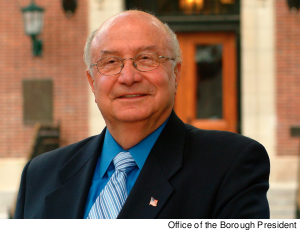Governor Andrew Cuomo has moved to replace two outgoing members of the Board of Trustees with allies from the political and business world.
Retiring Staten Island Borough President James Molinaro was named to the Staten Island board seat previously held by Kathleen Pesile, while business executive Barry Schwartz will replace Jeffrey Wiesenfeld. Both outgoing board members have served two seven-year terms.
Since the State Legislature is not now in session, the two can begin to serve immediately as recess appointees, but only for a limited time. State Senate confirmation hearings are expected in January. Both the PSC and the University Faculty Senate have proposed legislation that would fundamentally alter the selection process for trustees. The two organizations have called for a blue-ribbon panel to propose qualified candidates, ensuring that candidates would be able to exercise independent judgment on educational policy as trustees.
The Politician
 |
Molinaro, 82, has been a fixture in Staten Island politics for decades. He was chief of staff to Rep. Guy Molinari in the 1980s, and served as deputy borough president for 12 years before being elected borough president in 2001. Molinaro, who has been Staten Island’s borough president for the past dozen years, could not run for re-election in 2013 due to term limits. He is executive vice chair of the New York State Conservative Party; in 2010 he broke ranks to endorse Cuomo’s gubernatorial bid.
Molinaro does not have a college degree or extensive experience with higher education. But he has championed increased funding for the College of Staten Island (CSI) and has hailed CUNY as “a world-renowned network of the finest academic resources available.”
“I’m proud the governor felt I was qualified,” Molinaro told reporters when his appointment as a CUNY trustee was announced, according to the Staten Island Advance. “My education comes from practical experience in life,” he added. “And the governor is satisfied with that.” Molinaro said he particularly values CUNY’s role in opening up opportunities to students “who can’t afford the tuition you pay at Harvard and Yale.”
Molinaro will take the seat formerly held by Kathleen Pesile, a Staten Island businesswoman, former JP Morgan executive and CUNY graduate who began teaching at CSI as an adjunct lecturer in international business in 1995. Pesile’s original nomination to the board was expedited though the State Senate in May 1998 so that Pesile could vote on a controversial measure to abolish remedial classes at CUNY’s four-year colleges.
 |
Cuomo’s other pick, Barry Schwartz, is the executive vice chair of MacAndrews & Forbes Holdings Inc., its second-highest corporate officer. Schwartz arrives with experience in higher education at private colleges. He is the chair of the Board of Trustees at Kenyon College, a liberal arts college in Ohio where he received his bachelor’s degree, and is also on the Board of Visitors at the Georgetown University Law Center, where he earned his law degree. He is a member of the board at Human Rights First, a New York City-based non-governmental organization.
The CEO at MacAndrews & Forbes is Ronald Perelman, whose net worth of $14 billion makes him the 27th richest person in America, according to Forbes Magazine. In April 2013, Schwartz donated $25,000 to Cuomo’s re-election campaign, while Perelman and his wife, Dr. Anna Chapman, each donated $50,000. In March, Cuomo’s campaign received an unspecified in-kind contribution from MacAndrews & Forbes, valued at $11,768.
The Business Executive
Also a top officer and MacAndrews & Forbes is Cuomo’s former chief of staff, Steve Cohen, who joined the firm this year as the company’s executive vice president and general counsel. While Cohen no longer works for the governor, the political newspaper City & State describes him as “Andrew Cuomo’s most trusted confidant, even though he stepped down as [chief of staff] to the governor in 2011.”
Schwartz is a board member at several other companies that Mac Andrews & Forbes controls, including Revlon and Scientific Games, Inc., which provides services to the gambling industry. Last June, Mac Andrews & Forbes agreed to pay $850,000 to settle SEC charges that it deceived Revlon shareholders when it tried to buy all the company’s outstanding shares in 2009, as well as paying $720,000 to settle technical antitrust charges related to its purchase of stock in Scientific Games.
In addition to chairing the Kenyon College board, Schwartz has headed its Admissions and Financial Aid Committee. His donations to the college include a $2.5 million scholarship fund, which aims in part to support diversity in Kenyon’s student body.
In succeeding Wiesenfeld, Schwartz ends the tenure of the board’s most controversial and polarizing figure. A principal in Bernstein Global Wealth Management who worked for four years in FBI counter-intelligence, Wiesenfeld was appointed to the board by former Gov. George Pataki in 1999. He soon took to the role of being a conservative ideological enforcer who was often accused of disregard for academic freedom.
After City College faculty spoke at an October 2001 campus antiwar teach-in, Wiesenfeld told the New York Post, “I would consider that seditious behavior.” While CUNY could not fire faculty who spoke, he added, “They’re fortunate it’s not up to me.” In 2011, he called for Brooklyn College adjunct Kristofer Petersen-Overton to be fired because he disagreed with Peterson-Overton’s views on the Israel-Palestine conflict; a few months later, Wiesenfeld demanded that John Jay College be blocked from awarding Pulitzer Prize-winning playwright Tony Kushner with an honorary degree, again because of disagreements on the Middle East. In both cases he was briefly successful, but Brooklyn College and CUNY’s trustees soon reversed themselves in response to intense waves of academic protest, including quick responses from the PSC. In the Kushner episode, both former Mayor Ed Koch and The New York Times called for Wiesenfeld to resign.

